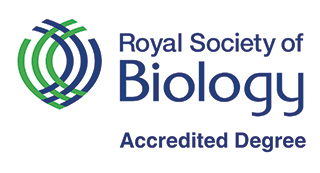BSc Biological Sciences
-
UCAS code
C100 -
A level offer
ABB -
Year of entry
2027/28 See 2026/27 entry -
Course duration
Full Time: 3 Years
-
Year of entry
2027/28 See 2026/27 entry -
Course duration
Full Time: 3 Years
This BSc Biological Sciences course is ideal for anyone who is passionate about all aspects of biology, and can be tailored to match your interests.
The majority of modules in BSc Biological Sciences are optional, giving you the opportunity to cover a broad range of topics or specialise in a particular area such as ecology and wildlife or human biology.
You will be taught by experts in their fields and have access to a range of research facilities. 91% of BSc Biological Sciences students said the course has developed the knowledge and skills they think they will need for their future (National Student Survey 2025, 91.3% of responders from BSc Biological Sciences).
Within environmental biology options you will develop an understanding of ecology, conservation biology and humankind's impact on biodiversity. The University of Reading’s award-winning campus is home to over 1,000 different animal species and is extremely useful for learning fieldwork skills. It also features the Cole Museum of Zoology and a herbarium, which house vast collections and offer volunteering opportunities. Additionally, you will have the chance to apply your scientific knowledge to a range of other habitats through our optional field courses. These last for up to two weeks and take place in Devon, Canada and South Africa.
Within biomedical subjects you will develop an understanding of human physiology and the basis of disease. The course has a strong practical element, and you will gain valuable experience of laboratory work and learn key molecular genetic and cell biology techniques. During your final year will have the chance to spend 11 weeks working on an original research project using cutting edge facilities and equipment. Previous topics include gene therapy of muscular dystrophy, emerging viral infections, the regulation of the stress response, stem cell biology, the spread of cancer and the control of blood clotting.
Our new £60m Health and Life Sciences building is the home of the School of Biological Sciences. It offers state-of-the-art research and teaching laboratories, seminar rooms, and plenty of study and social space, including a café. The building also houses the Cole Museum of Zoology. The collection, featuring more than 3,500 natural history specimens, provides a fantastic resource for biological scientists and the wider community.
All of our Biological Sciences graduates are eligible for membership of The Royal Society of Biology and can apply for Chartered Biologist status.
Placement
There are numerous placement opportunities throughout your degree.
You may opt to undertake a paid studentship funded by organisations such as the Wellcome Trust or the Nuffield Foundation. These can take place over six weeks during your summer break or on a part-time basis over a longer period. During studentships you will typically work on a set project and benefit from valuable training in techniques, experimental design and the interpretation of data.
Alternatively, you can opt to take the four-year version of this course, incorporating a year in industry. This is often paid and takes place in the year before your final year of study.
Our School has a dedicated academic in charge of placements, who can provide you with advice and support for whichever option you choose.
Build your skills portfolio with The Living Rainforest
Home to over 850 species of plants and animals, The Living Rainforest brings a vibrant rainforest ecosystem to life with a mission to educate the public about rainforests, conservation and sustainable living. Through our exclusive partnership, you will gain employer-verified evidence of your skills in a real-world setting. From animal observation and welfare, to public engagement and plant management, your skills will be officially signed off by the Living Rainforest team, boosting your portfolio’s impact with future employers.
For more information, please visit the School of Biological Sciences website.


